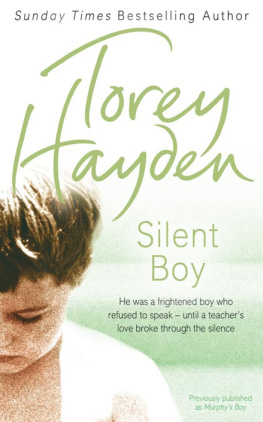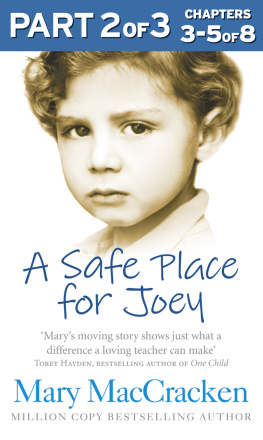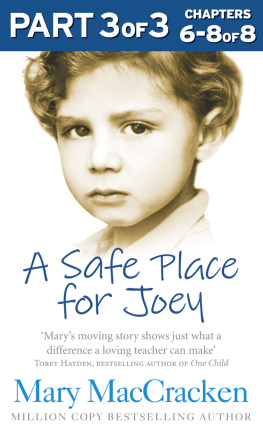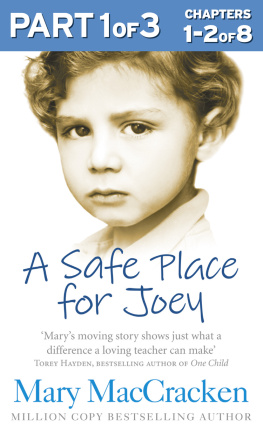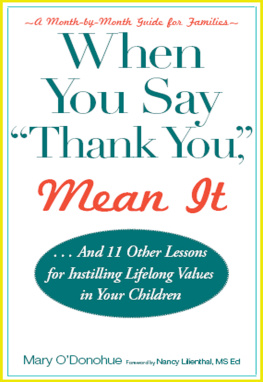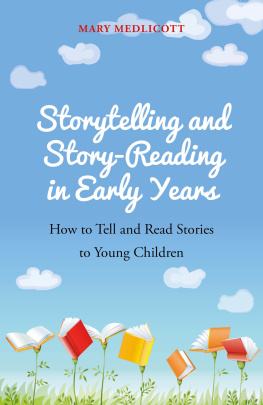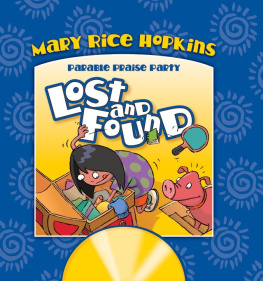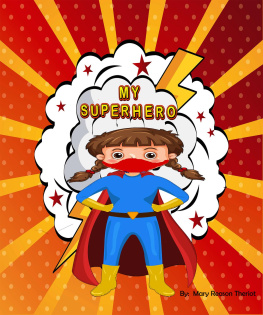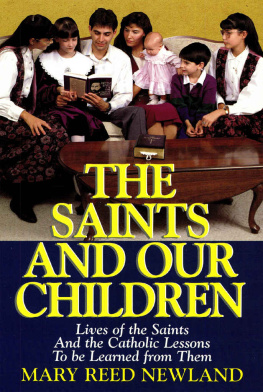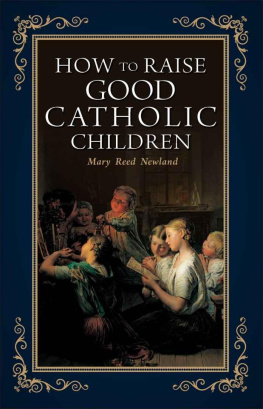Brian didnt come and didnt come, and I could not understand it. I had gotten there early on Monday morning, eager to see my first child, waiting for him, filled with excitement, anticipation. The Director had told me his name: Brian OConnell, from the Norfolk School District. She had done an intake on him earlier and said that he was eight and had been kept at home because the public school system did not have a suitable place for him and that more complete records would follow. This was often the case, but I didnt care. I really wanted to meet him first anyway and form my own opinion.
He was to be sent by taxi that first morning; meanwhile, bussing would be worked out for him. I waited in the Directors office by the window, watching each car arrive, so that I would be there when he came.
But the final car came and went and still no Brian. I lingered in the office.
What do you think, Zoe? What do you think happened? Do you think they changed their minds?
The fool taxi driver probably got lost. Do you want me to check the cab companies?
Zoe had little respect for taxi and bus drivers, and she directed them like a diminutive traffic cop, morning and afternoon, as they transported the children, keeping them parked so that the traffic could flow, moving them on as soon as the child was safe, giving them hell if they were late. She would have tackled the entire Norfolk cab line if I had asked her to. Loyal, snappy if Zoe liked you she could never help enough; if she didnt, you could court her endlessly without winning a glance.
Perhaps the driver had gotten lost. Zoe was often right, and I listened to her pithy wisdom as much as to the words of the professionals. Still, a call to the cab companies might prompt a call to the school district and I didnt want an emergency alarm the first day.
I think Ill go outside and wait a few more minutes, I told her.
Down to my classroom, past the Circle room, where I could hear the strains of Here we go, Looby-Loo, and I knew Dan would be gritting his teeth as he sang. He hated Circle, considering the songs and games too childish for his boys. I took my coat from the hook marked MARY. There had been time to make the labels for this room so far we had only two: MARY and BRIAN.
Outside, spring was beginning again. It always made itself known so urgently. Summer, fall, winter, did not impress themselves on my senses quite so ardently, but spring could never be ignored. The grounds surrounding the church were beautiful. There were two gardeners, so everything was carefully maintained. Just now there were crocuses and the beginning shoots of jonquils and daffodils, and forsythia spilled across the edges of the black macadam drive, softening its appearance.
It was a long sloping driveway, curving from the large parking lot at the side around to the back. It was in the back that the drivers let the children out, by the Directors office. I waited there awhile and then, feeling the wind, started to walk in order to warm myself.
The church itself was new, modern, handsome, in design. The building holding the Sunday-school rooms, the ministers office, and so forth, was open and large. It was here that we had our classes. I walked around it now, admiring the flow of line, the sensitive use of wood and stone, the windows, the recessed doorways.
I stopped suddenly in front of one of the doorways. There was a small figure crouched on the steps. I moved closer and saw it was a boy who arched and stared, instantly, totally still, much like a deer at unexpected sound or sight. I had the feeling that he might bolt if I approached too suddenly.
I waved to him and walked on a little way, then turned and walked back past him, calling to him this time, Good morning. There was a flurry of movement at my voice, but he did not leave the step. I went on past but zigzagged my parallel tracks so that I came closer to the steps.
He was wearing gray pants, a gray peaked cap pulled low over his eyes, a blue plaid jacket with a piece of white paper pinned to one shoulder with a safety pin. Written on it were two words: Brian OConnell.
I stopped in front of him. Hello, Brian, I said. His arms began to flap up and down in rapid motion. He reminded me now of a wounded bird, desperate to fly away but unable to leave the ground.
Why would they pin his name on him? Was he unable to remember it or unable to speak?
Im Mary, I said, speaking slowly, softly, my voice just above a whisper. Im your teacher. Im glad youre here.
What a hell of a way for him to arrive. What a horrible way to start school. The driver must have been new, must have let him out at the wrong door, and he had simply huddled there. Thank God he had not run. I was not sure how to get him inside. I talked a little more, softly, waiting to get an idea or a feel of what was best to do.
But we could not stay there much longer. Soon someone would come out, the Director, Zoe additional people would frighten him even more.
I moved closer to him and the flapping started again, wildly, then slowed. I wondered if I dared to touch him. Not yet. It was not right yet. But I could see him shivering, even with his heavy jacket.
It was time to go in.
Come, I said, its time for school to begin. And I led off, slowly, willing him to follow.
As it happened, I was lucky. I had chanced upon one of the best motivators for Brian: curiosity. I found out later that he was a naturally curious child, eager, bright; he was often triggered into trying something new because of his overwhelming desire to know.
Back up the macadam drive, avoiding the Directors office. That would be too much for him now. Into a small side door. I walked quickly, hoping to reach our classroom before Circle ended, pacing my walk to the sound of his steps, trying never to get too far in front for fear of losing him, but trying to move quickly.
Into the school, down the short flight of steps my classroom was the first on the right. Good I had left the door open. No need to pause. Into the room, and he followed. I shut the door then not to keep him there but to soften some of the noise as the others burst from the Circle room.
This is our room, I said. This is where I hang my coat.
I pointed to the other hook, the one with BRIAN neatly labeled over it. This is where you hang yours.
The flapping was just in the hands now. He circled the perimeter of the room, letting his hands flutter against the walls. I knew the feeling; often I had wanted to do it myself at large parties, to know the beginning and the end, to orient myself in relation to the periphery.
I sat down and let him flutter by. There was no hurry. I moved one of the small chairs over to the window and sat in the sunlight, looking toward the door. Keeping watch so that I could warn him, soften the surprise if the Director or someone were to come in.
Dans face appeared in the window of the doorway. I smiled to show him that all was well, and signaled that we needed time. He waved back and gave the okay sign thumb and forefinger together, last three fingers raised.
I knew we were all right then. Dan would tell Zoe that Brian had arrived and would explain to the Director, if she was there, though often she left right after Circle to make a fund-raising speech or do a screening interview.
For almost an hour Brian walked our room, paced its length and breadth, in the beginning making large detours around me, making the loop smaller and smaller until now he passed within twelve inches of me.
I talked to him from time to time about the school, where the bathroom was, how many children were there, where we ate lunch. It was like singing, more like singing than talking, really like the songs I used to sing to Elizabeth and Rick when they were small and ill with measles or chicken pox and would wake whimpering in the night. I would sit on the end of their beds and sing all the songs I could remember, the songs my mother had sung to me, camp songs, college songs, love songs; the content did not matter, nor the fact that my voice was funny and off-key. It was a way of telling them that I was there, so that they could relax and sleep again and not need to keep opening their eyes or cry or ask questions they didnt want answered. As long as they could hear my voice, there was no need to check.

